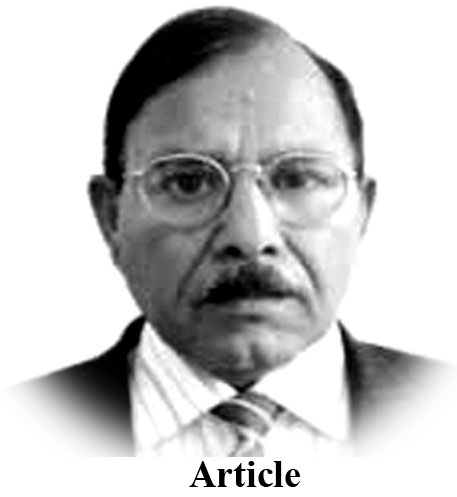Malik Ashraf
PRIME Minister Imran Khan was right on the money when in his address to the UN he termed RSS ideology a real threat to peace and security. A peep into the emergence of RSS and its fundamental creed corroborates the assertions made by him. The RSS, a right wing Hindu nationalist paramilitary organization widely regarded as the parent entity of BJP, the ruling party in India, was founded in Nagpur on 27 September 1925. Its initial objective was to provide character training through Hindu discipline and to unite the Hindu community to form Hindu Rashtra (nation). It promoted the ideals of upholding Indian culture and the values and the spread of Hindutva ideology. Hindutva means strengthening the Hindu community. It drew inspiration from European right-wing parties during the World War-II particularly the leaders like Benito Mussolini and Adolf Hitler and their philosophy of racial purity.
French Political scientist Christophe Jaffrelot specializing in South Asian affairs, particularly India and Pakistan points out that the ideology of the RSS along with other Hindu nationalist movements such as the Arya Samaj and the Hindu Mahasabha, thought of Muslims, Christians and the British as “foreign bodies” implanted in the Hindu nation, who were able to exploit the disunity and absence of valour among the Hindus in order to subdue them. However, majority of scholars believe that RSS was actually formed to fight the Indian Muslims.
In 1927 the founder of RSS Kashev Baliram Hedgewar led a Hindu religious procession beating drums in defiance of the usual practice not to pass in front of a mosque with music which triggered clash between the Hindu and Muslim communities. The Hindus had the upper hand. This incident vastly enhanced the prestige of RSS and contributed to its subsequent expansion. RSS adopted as its emblem the saffron flag of the Hindu warrior King ‘Shivaji ‘ and objected to the adoption of the tricolor flag of India as well as the Indian Constitution particularly its secular creed and the fact that it would treat all castes equally. RSS believed that partition was a result of mistaken soft-line towards the Muslims, which only confirmed the natural moral weaknesses and corruptibility of the politicians.
After partition the process of RSS becoming a political force to reckon with started during 1971 war between India and Pakistan which culminated in the emergence of Bangladesh. RSS provided support to the government, by offering its services to maintain law and order in Delhi and its volunteers were apparently the first to donate blood. The organization got a boost during emergency imposed by Indira Gandhi for its role in the movement against it which was finally lifted in 1977. The RSS and Jana Sangh, a nationalist party took complete advantage of the 1965 war with Pakistan to ‘deepen suspicion about Muslims’, and also en-cashed the growing unpopularity of Congress, particularly in the Hindi-belt, where a left-wing alternative was weak or non-existent. The major themes on the Party’s agenda during this period were banning cow slaughter, abolishing the special status given to Jammu and Kashmir and legislating a uniform civil code.
The RSS dominated Jana Sangh started making alliances by joining anti-Congress coalitions. It became part of the 1971 Grand Alliance and finally merged itself with the Janata Party in 1977. The success of Janata Party in 1977 elections made the RSS members central ministers for the first time (Vajpayee, Advani and Brij Lal Verma) and provided the RSS with an opportunity to avail the state and its instruments to further its ends, through the resources of various state governments as well as the central government. Meanwhile, the other components of the Janata Party denounced the allegiance that the ex-Jana Sanghis continued to pay to the RSS. This led to a ‘dual membership’ controversy, regarding the links the former Jana Sangh members were retaining with the RSS, and it led to the split of Janata Party in 1979.
The former Jana Sangh elements formed a new party, Bharatiya Janata Party (BJP) in 1980. BJP did not have much electoral success in its initial years and was able to win only two seats in the 1984 elections. After LK Advani replaced Vajpayee as party president in 1986, the BJP also began to rally around the Ayodhya campaign. In 1990, the Party organized the Ram Rath Yatra to advance this campaign in large-scale. Advani also attacked the then ruling Congress party with the slogans such as ‘pseudo secularism’, accusing Congress of misusing secularism for the political appeasement of minorities, and established an explicit and unambiguous path of Hindu revival.
The Ayodhya issue and the related communal riots which polarized the electorate along religious lines helped the BJP make good progress in the subsequent elections of 1989, 1991 and 1996. Finally the BJP won the elections in 2014 and a diehard disciple of RSS Narendra Modi, who is known as butcher of Gujrat for the massacre of Muslims became Prime Minister of India. The Party in its election manifesto pledged to undo Articles 370 and 35-A of the Indian Constitution. Modi adopted belligerent posture towards Pakistan which gave boost to his popularity. On 5 August he finally managed to fulfil his pledge by ending special status of Kashmir. In his address to the nation on Indian Independence Day he boasted that he had done within seventy days which could not be done in seventy years and that he had fulfilled the dream of vallabhai Patel of United India. Stripping 1.9 million Bengali Muslims in Assam of their Indian citizenship and the pogrom of Kashmiris are the outcome of the implementation of the fascist and supermacist ideology of ‘Hindutva’ which can have serious repercussion for the entire region.
— The writer is freelance columnist based in Islamabad.









